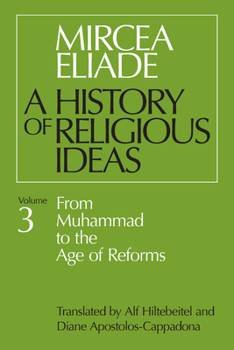History of Religious Ideas, Volume 3: From Muhammad to the Age of Reforms
(Book #3.1 in the Histoire des croyances et des idées religieuses Series)
Select Format
Select Condition 
Book Overview
This volume completes the immensely learned three-volume A History of Religious Ideas. Eliade examines the movement of Jewish thought out of ancient Eurasia, the Christian transformation of the Mediterranean area and Europe, and the rise and diffusion of Islam from approximately the sixth through the seventeenth centuries. Eliade's vast knowledge of past and present scholarship provides a synthesis that is unparalleled. In addition to reviewing recent interpretations of the individual traditions, he explores the interactions of the three religions and shows their continuing mutual influence to be subtle but unmistakable. As in his previous work, Eliade pays particular attention to heresies, folk beliefs, and cults of secret wisdom, such as alchemy and sorcery, and continues the discussion, begun in earlier volumes, of pre-Christian shamanistic practices in northern Europe and the syncretistic tradition of Tibetan Buddhism. These subcultures, he maintains, are as important as the better-known orthodoxies to a full understanding of Judaism, Christianity, and Islam.
Format:Paperback
Language:English
ISBN:0226204057
ISBN13:9780226204055
Release Date:March 1988
Publisher:University of Chicago Press
Length:367 Pages
Weight:1.05 lbs.
Dimensions:1.0" x 6.0" x 9.1"
Customer Reviews
3 ratings
Magisterial
Published by Thriftbooks.com User , 19 years ago
This three volume series is an excellent overview of human thinking and aspiration. The accomplishment is magnificent, a life work. Editing: Four Stars. Translations are always difficult. Copy Editing: Five Stars. Very clean.
The Triumph of the Idea of Ideas
Published by Thriftbooks.com User , 21 years ago
The final volume of the trilogy is the smallest, the most succinct and the most approachable of the three. After a brief review of the religions of Eurasia (from Turkey to Finland) we plunge in to the formative years of Christianity when the first step is taken toward ensuring an orthodoxy that would later be enforced with torture. Origen and Augusting, the two greatest writers of the church, are discussed in this context.Next is the story of Islam - or rather Muhammed - and how he became a warrior-ruler, leading his tribe to ever larger victories over Christendom. The lonely years of Judaism (from the fall of the Roman Empire to late in the Middle Ages) is given a empathetic hearing before moving onto the church in the Middle Ages, the Reformation and Counter-Reformation. Finally, a last look at Buddhism, the Tibetan way. ALways informative and entertaining, provocative with his conclusions.
Very good, just like the other parts of the series
Published by Thriftbooks.com User , 24 years ago
Mircea Eliade could be reasonably considered as one of the Re-founding Fathers of modern study of religion. His History of Religious Ideas is thus one of the corner stones of modern research in this field. This particular part of his history is as well written as the others. It deals very well with most of the improtant currents in mediaeval Christianity, including the spread of Christianity to Slav tribes, the Cluny rerform, the religious life associated with the rise of mendicant orders, Meister Eckhart, devotio moderna but he does not forget about the rise of neopaganism in Renaissance Italy, about the role of alchemy in religious feeling of the sixteenth century, he even ventures to say that modern physics was created almost unintentionally. This book is truly amazing.There are also some down sides to the book. One, it cannot be taken as the "state-of-the-art" of religous study. Eliade has been surpassed by new research in the field. It is therefore better to use the book as a general background. Second, it has been shown that Eliade unfortunately developed the habit of sometimes stretching the truth to fit his analysis. He did not use this questionable method to such an extent as to render his whole analysis worthless but it does cast a shadow on his academic honesty.BTW, I do not feel qualified to comment on his treatment of religious phenomena outside the Judeo-Christian cultural sphere.






